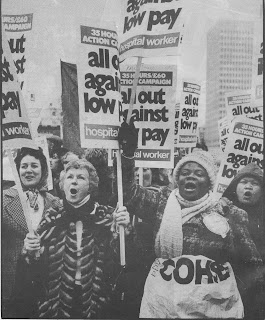
The 1979 low pay strike
The first three months on 1979 saw the bitterly fought low pay strikes in the public sector. As action by hospital workers, school cleaners and dinner ladies, dustmen and other local authority workers spread in support of their demand for a £60 minimum wage and the 35 hour week, the media vented their wrath in a campaign of unparalleled hysteria. NUPE was labelled a 'fascist union' by the Daily Mail, and the extreme right-wing leader of the Electricians'
From the beginning, the public sector union leaders refused to call all-out strike
action — instead leaving it to local areas and sections to take whatever action they saw fit. The inevitable result was that the strike was very patchy. In the best organised areas — for example among local authority workers in Hackney and in
But overall, the outcome was disappointing for many of the workers involved. The union leaders recommended acceptance of a 9% offer, plus £1 on account for full-time workers pending the Clegg Commission 'comparability' study, and nothing on shorter hours.
Low paid and part-time women in particular didn't gain much from the strike; the Clegg Commission recommendations gave the lowest grades (90% of whom are women) the lowest rises. Infact, the interests of women were very badly represented in the claim itself, which took no account in its demand for a 35 hour week that many women in the public sector are part time workers who already work less than 40 hours, and receive very low hourly rates. Roughly 75% of the membership of NUPE (the union with the largest number of members involved in the action) is women, but they are totally under-represented at all levels of the union. There's no doubt that this weakened the struggle.
Other divisions also took their toll: 'One of the worst problems we've got is inter-unions rivalry — especially between NUPE and the G&M. In our hospital we held a meeting last week of all four unions to try and stop these squabbles. And lack of information is a real problem. There could be a strike down the road and we'd only hear about it after it was over.' (Margaret Carlin, NUPE nurse,
Although there is a growing shop
It also meant that there was no organised force within the strike putting over
socialist answers to the real worries facing many of the low paid public sector
workers. The most pressing of these was the fear that if the employers conceded
the full claim, it would lead to a massive loss of jobs — especially part-time jobs - harder work, and worse services.
Organising to Win – Big Flame
217 Wavertree Road, Liverpool 7

